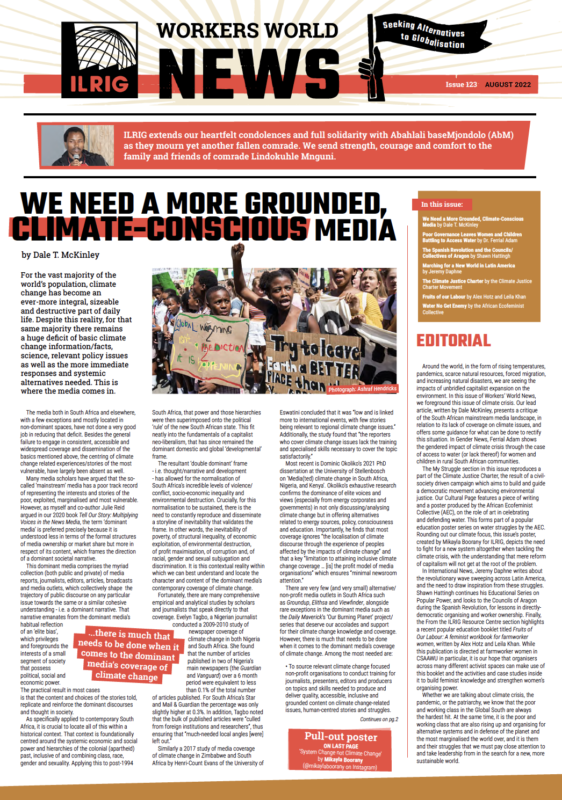South African Current Events - The Facts
South African Current Events - The Facts
Blog Article
5 Easy Facts About South African Current Events Shown
Table of ContentsThe Best Strategy To Use For South African Current EventsThe 5-Second Trick For South African Current EventsSouth African Current Events Fundamentals ExplainedSouth African Current Events Things To Know Before You BuyThe 3-Minute Rule for South African Current Events
The Limpopo Mirror is released in Louis Trichardt, a town in the north of South Africa's Limpopo province. Picture: Anton van Zyl This week the Competitors Payment is probing exactly how on-line information is impacted by AI chatbots, search and advertising and marketing technology. The result of the hearings is very important for the future of information coverage in South Africa.Subscriptions and sales of specific copies were normally suggested to cover this, however the genuine money was marketing - and for some magazines, like the Cape Argus in Cape Community, the classifieds. South African current events. The advertisers sponsored the news, whether in a national daily, or a tiny weekly newspaper dispersed in a country town
Arounds this income paid for the reporter to go to the monthly council meeting, cover institution occasions and visit the court to figure out that may have wound up on the incorrect side of the regulation. Take for instance the Limpopo Mirror, an once a week newspaper published in Louis Trichardt which among us, Anton, has.
We 'd typically market simply over 8,000 duplicates. The cost of printing was about 15% to 20% of our turnover. That has actually gone up to 30% and 35%. The ad loading (the portion of space dedicated to advertising and marketing in contrast to news) was between 50% and 60%. South African current events. This has gone down to below 30% and some weeks we don't even get to 20%.
How South African Current Events can Save You Time, Stress, and Money.
The decline in advertising and marketing leads to fewer web pages in the newspaper, and less area for newspaper article. As the web became progressively preferred, papers began releasing their tales online, normally totally free. Limpopo Mirror was among the very first papers in the nation to publish a web site with weekly information updates.
In the beginning most of us were driven by testing and the thrill to be very early adopters so we really did not lose to the competition. There was no sensible business design. Adverts were rare and it took a while before this came to be the main way people look at here now review their information.
South African Current Events Fundamentals Explained
It was hassle-free, prompt and generally cost-free, particularly as the rate of data went down. At the very same time, acquisitions of printed newspapers started to decrease. A few instances: In 2006 the Sunday Times was the largest weekend paper in South Africa, with an audited blood circulation of just over half a million copies.
This consisted of greater than 11,000 electronic duplicates. The Daily Sunlight was once the greatest marketing daily, and in the last quarter of 2007 boasted a flow of over 513,000 duplicates. In 2014 it went down to below 13,000 offered copies and transformed its distribution approach. This has been the pattern for many long-running newspapers on earth.
The freesheet version does not work visit the site well in casual settlements or rural locations. To efficiently reach viewers in these locations, it's too expensive to supply door-to-door. Bulk drops of papers have to be dropped off at purchasing centres, for example, and wastage of these is high. This suggests you have to publish bigger quantities to get to the exact same number of people and this is not economically feasible.
To create a paper has become incredibly costly, which suggests advertising tolls have actually had to enhance. To go was the classified sections of papers.
Some Known Factual Statements About South African Current Events
While this was all occurring, papers such as the Limpopo Mirror attempted to maintain up. Print circulation went down to around the 4,000 mark, the viewers did not relocate away.
The difficulty was to transform that readership into a profits design that would pay for top quality journalism.
Additionally social networks keeps reporters on their toes. There is no data to prove this, it seems to us that mistakes are spotted extra swiftly, and dishonest behaviour pounced on with greater vigour nowadays. The reduced cost of entry has additionally permitted new kinds of information publications to start, like GroundUp, which Nathan modifies.
Some Known Factual Statements About South African Current Events
Why is advertising not functioning for information publications? Advertising and marketing revenue has actually been destroyed mainly by Google Ads and social media adverts.
BNN is a news author. Their news tales constantly place very on Google News searches.

Days after Anton's story was released we both searched "Vhembe" (the area where Anton reports from) on Google News. Commonly BNN information stories, plagiarised and seemingly revised by ChatGPT or some other AI chatbot, appear greater in Google search than their genuine counterparts.
Two different Google items drive this rip-off: Google Search drives readers to BNN; Google Advertisements provides the reward for BNN's Going Here parasitic service design. Until now in 2024, 72% of GroundUp's website traffic has actually involved our website via internet search engine. Google is in charge of 99% of that. This is either directly utilizing Google Look or by means of Google Discover that is set up on all Android phones.
Report this page